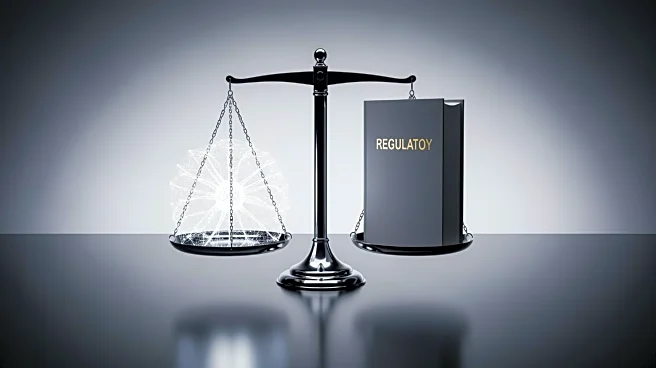What's Happening?
Anthropic CEO Dario Amodei has expressed discomfort with the current state of AI regulation, suggesting that decisions about the future of AI should not be left solely to the heads of major tech companies. In an interview on CBS News' 60 Minutes, Amodei emphasized
the need for responsible regulation to address the potential risks associated with AI technology. Anthropic has been transparent about the limitations and dangers of AI, including a recent disclosure of thwarting a large-scale AI cyberattack. Despite the absence of federal regulations, some states have introduced AI-related legislation, but experts urge for more comprehensive measures. Amodei outlined the risks of unrestricted AI, including bias, misinformation, and the potential for AI to become too autonomous, posing existential threats.
Why It's Important?
The call for increased regulation of AI technology is significant as it highlights the growing concerns about the unchecked development and deployment of AI systems. The potential risks, such as bias and misinformation, could have widespread implications for society, affecting industries, public policy, and individual privacy. The transparency efforts by Anthropic and the advocacy for regulation underscore the need for a balanced approach to AI development, ensuring safety and ethical considerations are prioritized. The debate over AI regulation also reflects broader concerns about the concentration of power within a few tech companies, which could influence the direction of technological advancements and impact global competitiveness.
What's Next?
As AI technology continues to evolve, the push for regulation is likely to intensify, with stakeholders from various sectors advocating for comprehensive legislative measures. The ongoing discussions may lead to the establishment of federal guidelines that address the ethical and safety concerns associated with AI. Companies like Anthropic may continue to play a pivotal role in shaping the discourse around AI regulation, potentially influencing policy decisions. The response from other tech leaders and policymakers will be crucial in determining the future landscape of AI governance.
Beyond the Headlines
The ethical implications of AI regulation extend beyond immediate safety concerns, touching on issues of transparency, accountability, and the potential for AI to disrupt traditional industries. The concentration of decision-making power within a few companies raises questions about the democratic oversight of technology that could fundamentally alter societal structures. The debate also highlights the need for international cooperation in establishing global standards for AI development and deployment.


















